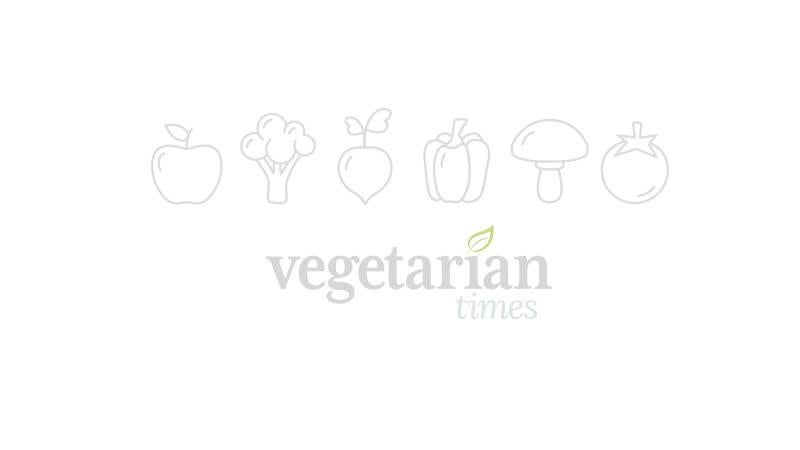A Meat-Free Pregnancy

I was just a couple of months pregnant when the questions started. My meat-and-potatoes mother-in-law would ask her son hopefully, “Has she started eating meat again?” Each time he’d laugh and say, “No.” I chose vegetarianism for health and ethical reasons 10 years before I got pregnant, so I knew I wouldn’t go back.
My mother-in-law was worried because pregnancy puts enormous nutritional demands on a woman’s body, and it’s a common mis-conception that those demands can’t be met as easily with a vegetarian diet. “A mother’s vegetarianism has absolutely no negative effects on her baby,” says former obstetrician Holly Roberts, DO, author of Your Vegetarian Pregnancy. Science says the same: “The source of dietary protein does not seem to affect birth weight,” reported a groundbreaking study involving the vegan members of a Tennessee commune, published in Southern Medical Journal in 1987.
“Usually vegetarians gain a little less weight during pregnancy,” Roberts adds, “and because their diets are usually lower in fat and they tend to be educated about their diets, they go into pregnancy healthier.” That’s why Roberts’ first piece of advice is simply to relax.
MEAL-PLAN YOUR PREGNANCY
But don’t interpret her advice to mean you can sit around eating macaroni and cheese for nine months. Women need only an extra 300 calories per day during their second and third trimesters, which isn’t that much. Those calories could come from simply eating a little bit more at every meal or adding an extra snack to your day.
Furthermore, there are certain key nutrients and vitamins that pregnant vegetarians must consume, and it takes a little effort to be sure you’re getting the proper amounts every day. “Planning is really critical,” says nutritionist Cynthia Sass, RD, spokesperson for the American Dietetic Association (ADA), who specializes in vegetarian and vegan diets. “You can’t leave it up to chance or hunger or cravings—you need to plan.”
Sass develops what she calls “food budgets” to help her clients. “I figure out on a day-to-day basis how many servings from each food group they need and how to put meals together so that at the end of the day they’ve met all of their needs for calories and protein and nutrients.” She also recommends taking some time every evening to plan out what to bring to work for the next day’s lunch, making sure all food groups and nutrients are accounted for.
LISTEN TO YOUR CRAVINGS
The stereotypical mom-to-be munches endless bowls of pickles and ice cream, but in reality, cravings are much more varied than that. For instance, I craved peas, which was actually a positive thing. They’re a good vegetarian source of protein and have tons of fiber to help with pregnancy’s unwanted sidekicks—constipation and hemorrhoids. “There are common cravings: chocolate, ice cream, foods with a strong taste, foods with sugars and foods with vinegar,” says Roberts. But the key is knowing when to listen to them and how to fulfill them without blowing your food budget.
“Cravings, especially when you’re pregnant, may indicate that you need certain nutrients from that food— but they may not,” says Sass. If all you can think about is eating an entire apple pie, Sass has some advice. “Think about the taste, texture, flavor and temperature of the food you’re craving, and see if you can find a healthier substitution.” Instead of that apple pie, for example, you could sprinkle an apple with cinnamon, nutmeg and a bit of brown sugar, and bake it in the microwave.
AVOID FAMILY FOOD FEUDS
Sometimes it’s not just the cravings giving you pangs. Besides my mother-in-law, most of the skeptics I met were people I knew from work. No matter who’s pestering you, it’s important to remember that most of them mean well. That said, there are ways to persuade even the most persistent great-aunt that there is no harm in following a vegetarian diet while pregnant. “I like to say that there’s no food that humans need,” says Sass.
“There are only nutrients that we need, and there’s no nutrient that you can’t get from a plant-based food.” Or you can point out, as Roberts does, that, “In general, meat eaters are much more overweight and much more likely to have cholesterol problems, heart disease and hypertension.”
If that doesn’t work, download the ADA’s position paper on vegetarianism (go to www.eatright.org/ada/files/veg.pdf). It examines trends, research and health issues and states that, “Well-planned vegan and other types of vegetarian diets are appropriate for all stages of the life cycle, including during pregnancy, lactation, infancy, childhood, and adolescence.” Even my mother-in-law came around. As the months passed, she asked questions but was respectful and sincere. And as I brought her granddaughter into the world, she realized that neither of us needed meat to be healthy, happy and strong.